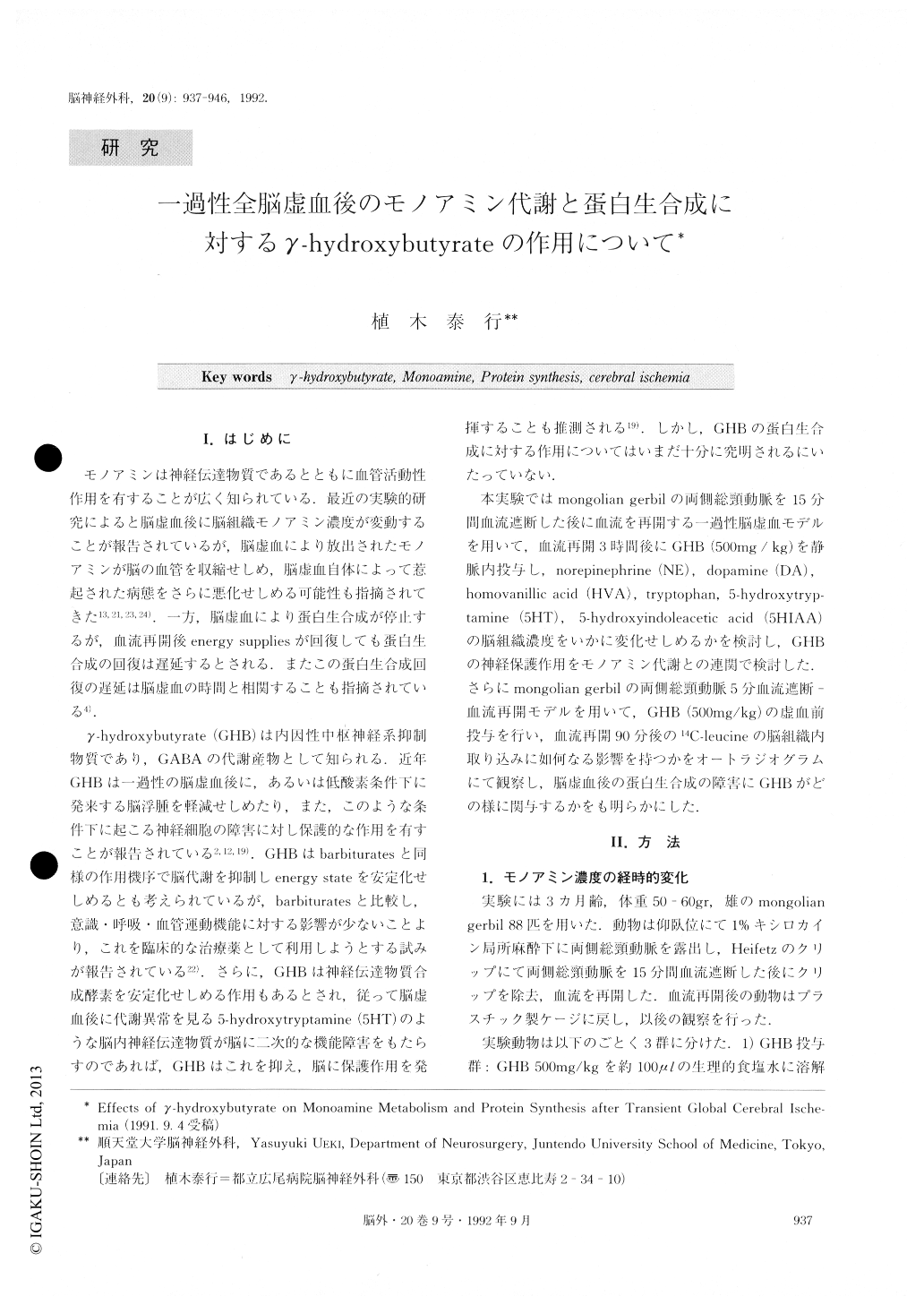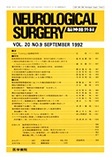Japanese
English
- 有料閲覧
- Abstract 文献概要
- 1ページ目 Look Inside
I.はじめに
モノアミンは神経伝達物質であるとともに血管活動性作用を有することが広く知られている.最近の実験的研究によると脳虚血.後に脳組織モノアミン濃度が変動することが報告されているが,脳虚血により放出されたモノアミンが脳の血管を収縮せしめ,脳虚血自体によって惹起された病態をさらに悪化せしめる可能性も指摘さてしてきた13,21,23,24)一方,脳虚血により蛋白生合成が停止するが,血流再開後energy suppliesが回復しても蛋白生合成の回復は遅延するとされる.またこの蛋白生合成回復の遅延は脳虚血の時間と相関することも指摘されている4).
γ—hydroxybutyrate(GHB)は内因性中枢神経系抑制物質であり,GABAの代謝産物として知られる.近年GHBは一過性の脳虚血後に,あるいは低酸素条件下に発来する脳浮腫を軽減せしめたり,また,このような条件下に起こる神経細胞の障害に対し保護的な作用を有すことが報告されている2,12,19).GHBはbarbituratesと同様の作用機序で脳代謝を抑制しenergystateを安定化せしめるとも考えられているが,barbituratesと比較し,意識・呼吸.血管運動機能に対する影響が少ないことより,これを臨床的な治療薬として利用しようとする試みが報告されている22).さらに,GHBは神経伝達物質合成酵素を安定化せしめる作用もあるとされ,従って脳虚血後に代謝異常を見る5-hydrdoxytryptamine(5HT)のような脳内神経伝達物質が脳に1次的な機能障害をもたらすのであれば,GHBはこれを抑え,脳に保護作用を発揮することも推測される19).しかし,GHBの蛋白生合成に対する作用についてはいまだ十分に究明されるにいたっていない.
本実験ではmongoliangerbilの両側総頸動脈を15分間血流遮断した後に血流を再開する.過性脳虚血モデルを用いて,血流再開3時間後にGHB(500mg/kg)を静脈内投与し,norepinephrine(NE),dopamhie(DA),homovanillic acid(HVA),tryptophan,5-hydroxytryp-tamine(5HT),5-hydroxyindoletic acid(5HIAA)の脳組織濃度をいかに変化せしめるかを検討し,GHBの神経保護作用をモノアミン代謝との連関で検討した.さらにmongolian gerbilの両側総頸動脈5分血流遮断-血流再開モデルを用いて,GHB(500mg/kg)の虚血前投与を行い,血流再開90分後の14C-leucineの脳組織内取り込みに如何なる影響を持つかをオートラジオグラムにて観察し,脳虚血後の蛋白生合成の障害にGHBがどの様に関与するかをも明らかにした.
The effects of y-hydroxybutyrate (GHB) on 1) mo-noamine metabolism, and 2) protein synthesis were ex-amined in a gerbil stroke model.
The monoamine metabolism was studied by occlud-ing bilateral common carotid arteries for 15 minutes fol-lowed by GHB administered intravenously 3 hours la-ter. Tissue monoamine concentration was examined up to 8 hours after recirculation. Three hours after GHB administration, dopamine (DA) had increased to almost twice that of the non-treated group, whereas homova-nillic acid, a metabolite of DA, did not show any signi-ficant difference. These results may mean that GHB will facilitate DA synthesis but that it has no influence on its release. Therefore, a DA-mediated increase in cerebral blood flow in the cerebral cortex cannot be ex-pected. Tryptophan, a precursor of 5-hydroxytrypta-mine (5HT), started to increase just after recirculation, reaching a level of over four times that of the control value at 2 to 3 hours, and then starting to decrease in the non-treated group. This decline in tryptophan was markedly facilitated by GHB administration within 1 hour. On the other hand, 5HT increased only very slightly in the cerebral cortex 1 hour after GHB admi-nistration, the change ratio being 1/30 of tryptophan. It can therefore be speculated, that the decrease in tryp-tophan brought about by GHB administration is due to the improvement in disturbed protein synthesis rather than to stimulation of 5HT synthesis.
Protein synthesis was studied by administrating GHB 2 minutes prior to a 5-minute temporal common carotid artery occlusion. Ninety minutes after recirculation, animals were given a single dose of "C-leucine and further 60 minutes were allowed to pass before sacri-fice. Autoradiographs of the GHB-treated group were compared with those of the non-treated group. With GHB pretreatment, autoradiographs showed an in-creased uptake of 14C-leucine in at least the hippocam-pus, thalamus, and hypothalamus, and in two out ofthree animals, there was diffusely increased uptake. Thus, it is speculated that GHB is effective in improv-ing the protein synthesis in the postischemic period. The favorable function of GHB during cerebral ischemia is regarded by many to be the prevention of energy failure by reducing cerebral metabolism. On the other hand, the results derived from the present studysuggest that GHB may improve protein synthesis in the postischemic period. Thus, we suggest that GHB is use-ful if given at the acute stage of cerebral ischemia such as during internal carotid artery or middle cerebral artery occlusion.

Copyright © 1992, Igaku-Shoin Ltd. All rights reserved.


